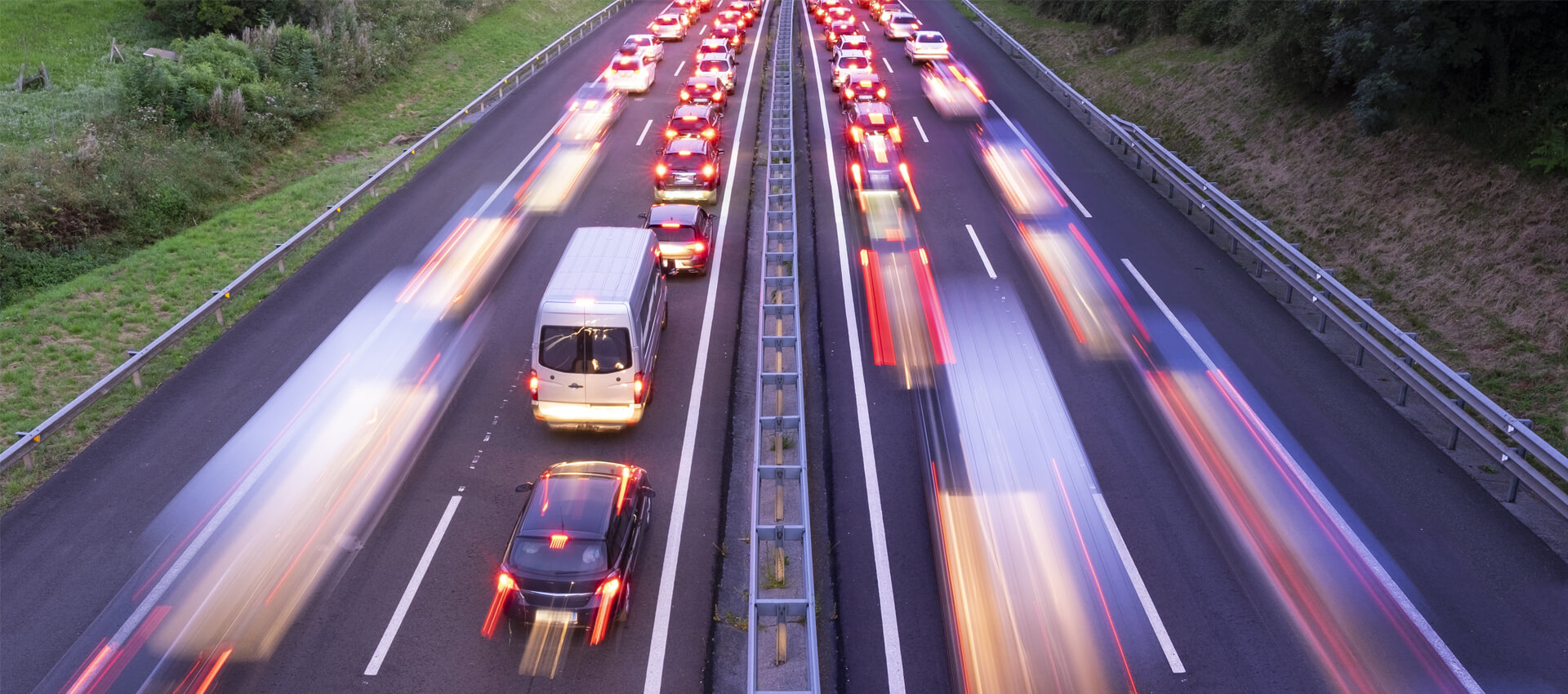Get into gear! Brace yourself for the driving law overhaul in 2024

The dawn of the New Year presents a golden opportunity for a fresh start and an abundance of new driving laws! Like many others, you may have started this year by writing a floor-length list of goals you wish to accomplish.
These goals could include getting fit and healthy, pursuing a new job, or even obtaining your full driver’s licence. However, if getting in trouble with the law isn’t on your list of accomplishments for 2024, then listen up!
Throughout 2023, we witnessed a number of major changes being made to the Highway Code, and we were introduced to a handful of new need-to-know driving laws and regulations. If you weren’t already aware of these, then don’t panic! We’ve done all the legwork on your behalf and written this blog post to ensure that you’re compliant and informed when you’re behind the wheel.
We’ve done this in the hopes that you won’t spend your 2024 forking over hundreds of pounds and collecting points like Pokémon cards; instead, you can focus on achieving your goals and making 2024 your best year yet.
Out with the old driving law, in with the new
Year on year, changes in driving laws and regulations aim to enhance road safety for drivers and vulnerable road users alike, and last year was no exception!
Distracted driving has long been identified as a major contributor to road accidents in the UK, and this is reflected in some of the new driving laws and updates made to the Highway Code that have now come into effect.
One significant change and update to the Highway Code states that if you are caught using or even holding your phone while driving, you can receive a fine of up to £200 and six points on your licence.
This change is viewed as a proactive step towards deterring this dangerous driving behaviour, aligning with broader governmental efforts to make our roads safer for everyone.
We feel that it’s worth noting, within the initial two years of obtaining your full driving licence, if you’re caught using a mobile device while operating a vehicle and accumulate six penalty points, the consequence is the revocation of your driving licence.
The thought of losing your licence and having to restart the entire process again has the power to send a little shiver down our spine! The potential setback and inconvenience associated with restarting your driving journey underscores the gravity of the offence, emphasising the need for strict adherence to the new driving law!
In their continued quest for safer roads, another change has been made to the Highway Code, impacting those who neglect to refuel. There is now a £100 fine and points for those who run out of fuel during their journey, obstructing traffic.
They haven’t forgotten about you futuristic electric car owners either, the same now applies if your electric car runs out of battery during your journey.
While it may seem obvious, many drivers break down due to insufficient fuel in their tanks. In fact, according to the RAC, a significant number of their callouts result from drivers running out of fuel mid-journey and subsequently breaking down at the side of the road.
We understand that this can easily happen, but we can’t help but think about how inconvenient this is for the driver. Seriously, nobody wants to spend hours in a potentially dangerous situation waiting for recovery!
How far can I drive on empty?
Due to the new driving law, it’s worth knowing how far you can drive when your tank is empty! For most vehicles, when the tank is empty, it typically means that there is around 10% of fuel remaining.
Many people believe that when your tank is zero, you can drive for an average of 30-50 miles. However, the distance you can drive before you run out of fuel depends on your vehicle model, road conditions and your driving habits.
When your car is driving on empty, it begins to pick up debris from the bottom of the fuel tank. When driving a diesel car, the engine management system will typically shut the car down when this happens to prevent damage to the vehicle.
However, petrol vehicles do not have this function and driving on empty can incur extremely costly garage fees. This is due to the potential fuel filter, pump and catalytic converter becoming damaged. Making it all the more important to ensure that you keep an eye on your fuel tank at all times, and if it does dip low, try to top up as soon as you can.
If you’re out and about and you notice that your fuel is low, there are a few ways in which you can try and reserve fuel:
- Drive with a light foot and maintain consistent speed.
- Unplug any charging devices/electronic accessories.
The driving law changes haven’t stopped there
Did we forget to mention that neglecting your tyre maintenance could result in fines of up to £10,000 AND 12 points on your licence? Yep, well, we’re mentioning it now!
You could find yourself facing a hefty fine and penalty points (which could potentially lead to a road ban) if you don’t take good care of your tires and keep them in roadworthy condition.
Now, that is a lot of money… think of what else you could do with £10,000. You could definitely put that money to better use, like going on a luxurious holiday, putting down a deposit on a house, or even buying a motorbike!
Speaking of bikes, further emphasis on the importance of stopping and waiting for a safe gap when cyclists are approaching (whether they are using a designated cycle lane or the regular road) can also be found updated within the Highway Code.
Alongside this you can also find the introduction of the ‘Dutch Reach’ in the ‘waiting and parking’ section of the Highway Code. This technique is essentially encouraging drivers to open their car doors using the hand opposite the door for the safety of cyclists and pedestrians.
Just make sure you’re only using the ‘Dutch Reach’ on your car door handle and not dutch reaching for your mobile phone while driving and breaking the new driving law!
Summary of recent changes and driving law updates in the Highway Code:
- The legislation regarding mobile phone usage is now crystal clear and drivers caught holding or using their phones will face fines of up to £200 and six points on their licence.
- There has been a complete ban on holding and using devices while driving. Any driver holding or using their mobile, sat navs, tablets, or any other data-transmitting devices while driving could be penalised.
- The introduction of the ‘Dutch Reach’ can now be found in the ‘waiting and parking’ section of the Highway Code. This technique is essentially encouraging drivers to open their car doors using the hand opposite the door for the safety of cyclists and pedestrians.
- There are now penalties for running out of fuel and causing a traffic obstruction. To avoid a £100 fine and points on your licence we suggest downloading a free app on your phone called ‘PetrolPrices’. With over 2.75 million users, this free app allows you to search and compare fuel prices across the UK and can help you to avoid any unnecessary fines and points.
- For those driving electric cars, if you incur a flat battery and cause a traffic obstruction you could receive penalties. Ensure that you plan your journeys and keep your vehicle charged to prevent this happening to you. You may even want to download a free app called ‘Zapmap’, this app maps public charging points throughout the UK.
- The importance of stopping and waiting for a safe gap when cyclists are approaching (whether they are using a designated cycle lane or the regular road) can be found updated within the Highway Code.
- Neglecting your tyre maintenance can now result in fines of up to £10,000 and 12 penalty points on your licence, which in theory could potentially lead to a road ban.
- In a bid for drivers to maintain optimal visibility, the Highway Code now emphasises that no objects should obstruct the driver’s view and the windscreen should be clear from any obstructions.
- There is now updated guidance available on safe passing distances and speeds when overtaking vulnerable road users.
Exceptions to the rule
As previously discussed, it’s illegal to hold or use a phone, sat nav, tablet, or any device capable of sending or receiving data while driving or riding a motorcycle. This driving law remains applicable even when you are stopped at traffic lights, queued in traffic, supervising a learner driver, driving a car that turns off the engine when stationary, or holding and using a device in offline or flight mode.
However, the government website states that you are allowed to use a handheld device in specific situations. These include making a 999 or 112 emergency call when it is unsafe or impractical to stop, being safely parked, making a contactless payment in a stationary vehicle, or using the device to remotely park your vehicle.
A little bit about ULEZ
The Ultra Low Emission Zone (ULEZ) underwent a significant expansion in August 2023, now enveloping all 33 boroughs of London. This expansion marked a crucial step in the city’s ongoing battle against poor air quality, demonstrating a commitment to creating a healthier and more sustainable urban environment.
Initially concentrated in Central London, the ULEZ now casts its influence across the entire metropolis, operating 24 hours a day in a bid to address the pervasive issue of air pollution.
For those vehicles that do not meet the minimum emission standards, there are financial implications. Owners of vehicles exceeding these standards can expect to pay a daily charge of £12.50.
The primary motivation behind this was the alarming levels of air pollution in London, posing serious threats to public health and the environment. By extending the ULEZ to cover all boroughs, authorities aimed to create a comprehensive and consistent approach to reducing emissions from vehicles, one of the major contributors to air pollution in urban areas.
Will we see a ripple effect on the 20mph speed limit cap?
In a monumental move towards safer roads, Wales implemented a significant change in September, reducing speed limits on all residential roads from 30mph to a 20mph cap. This transformative initiative stems from a driving law passed by the Welsh Government in 2022, establishing 20mph as the default speed limit across residential areas.
The foremost objective behind this legislative shift is a steadfast commitment to enhancing road safety for both pedestrians and motorists. By imposing a 20mph speed limit, the Welsh Government aims to mitigate the severity of potential accidents and foster an environment where communities can thrive without the constant threat of high-speed traffic.
The reduction in speed limits is a strategic measure to improve air quality by curbing vehicular emissions. Slower speeds translate to lower emissions, contributing to cleaner air and a healthier living environment for residents. Simultaneously, the initiative is designed to minimise noise pollution, creating more peaceful and serene neighbourhoods where the hum of traffic becomes a distant memory. Bliss!
The eradication of pavement parking
In Scotland, the pavement parking ban came into effect in December 2023. The primary objective of this new driving law is to combat the longstanding problem of vehicles encroaching onto pavements, creating obstacles for pedestrians, wheelchair users, and parents with prams.
By outlawing pavement parking, the Scottish Government aims to foster an inclusive environment where pavements serve their intended purpose as safe pathways for all.
Local authorities have been authorised to now issue fines to individuals who are caught parking on pavements. This strategic enforcement is a proactive measure designed to dissuade inconsiderate parking practices, ensuring compliance with the new regulations.
The fines, set at an initial £50, serve as both a punitive measure and a reminder of the collective responsibility each driver holds in maintaining accessible public spaces.
Abide the new driving laws with our top car maintenance tips
- Regular oil changes:
Fresh oil keeps your engine running smoothly and prevents unnecessary wear and tear. Make sure to change it as recommended by your vehicle’s manufacturer.
- Keep tyres inflated:
Under-inflated or over-inflated tyres can be dangerous. Check your tyre pressure at least once a month and before long trips.
- Rotate and balance tyres:
Tyre rotation and balancing promote even tyre wear, extending their lifespan.
- Brake system checks:
Brakes are a critical safety feature. Pay attention to any squeaking or grinding noises and get your brakes inspected regularly.
- Fluid levels:
Keep an eye on essential fluids like coolant, transmission fluid, brake fluid, and power steering fluid. Low levels can lead to engine overheating and other mechanical problems.
- Air filter replacement:
A clean air filter ensures proper airflow to your engine, improving fuel efficiency and engine performance.
- Battery maintenance:
Regularly test your battery’s voltage, especially before long trips.
If you’re learning to drive and aspiring to stay ahead of the curve, our Theory Test 4-in-1 app is your ticket to being well-prepared for what lies ahead. Continuously updated with comprehensive content, our app ensures you’re in sync with all things related to the Highway Code. Our ongoing commitment to providing you with the latest and most accurate information means that you’ll be well-versed in any new laws that may come into effect in 2024.
If you haven’t tapped into our app yet, fear not! You can stay informed by regularly checking back on our website… because as soon as any changes hit the road, you can trust us to be the first to share the news with you!

